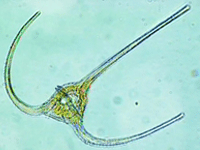
Environment & biodiversity
- Location:
Port-Louis (France) - Sponsor:
Yoann Burban - Grant:
€10,000 at the selection committee meeting on 21 October 2019
Project leader
The goal of the Observatoire du Plancton, created in 2003 and based in Port-Louis, Morbihan, is twofold. The association regularly conducts scientific studies on plankton: its observations come from plankton monitoring, physico-chemical water analyses, and microplastic sampling. Its teams work on different areas along the South Brittany coastline: the Gulf of Morbihan, the Etel river, Lorient harbour, etc.
The other goal of the Observatoire du Plancton is to share the results of its work with as many people as possible: maritime professionals, amateur sailors, volunteers from environmental protection associations, schoolchildren, the general public, etc.
Improving knowledge of plastic pollution in the oceans
Microplastics are plastic particles smaller than 5 millimetres that drift and threaten the balance of marine biodiversity. They are present everywhere in the oceans, including in the sediment and in organisms. In the Mediterranean, their presence has already been well documented, inventoried and mapped. But data for France’s Atlantic coast is much rarer. This lack of knowledge makes it impossible to establish the extent of microplastic pollution and thus to estimate the potential danger to people and ecosystems. Out of the question therefore to devise global solutions that would address the problem.
Looking for data
The Observatoire du Plancton is therefore launching a new scientific mission coordinated by the Université de Bretagne Sud that will study microplastics. In keeping with the observatory's mission, the objective is twofold: both scientific and educational.
In order to acquire new knowledge about local microplastics pollution and its geographical and time-based distribution, the observatory will rely on participatory science. The association will involve the relevant associations in extracting and characterizing the microplastics. The prerequisite is to standardize collection methods to ensure homogeneous data that can be exploited by the scientific community. To this end, and with the support of the Veolia Foundation, the Observatoire du Plancton is equipping itself with an imaging system to measure and classify organisms present in a liquid medium: a Zooscan.
This mission is all the more important as the European Marine Strategy Framework Directive sets Member States the objective of achieving "good environmental status" in European marine waters by 2020. The Observatoire du Plancton project is a perfect fit for this objective.

